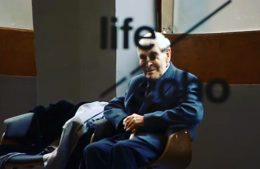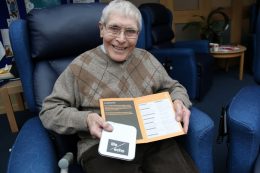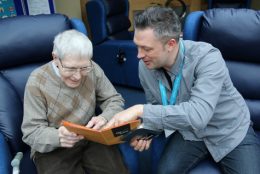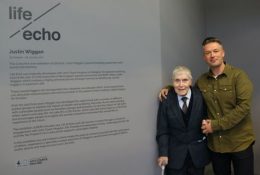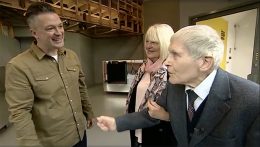Since 2013 Justin has been working with hospice patients at John Taylor Hospice, creating their Life Echoes. Through a series of one-to-one sessions and the completion of a written life map called a “memory atlas“ with patients and carers, participants are encouraged to share positive memories which can be triggered by sounds.
Justin then makes a Life Echo, an individual recording featuring these sounds. Each participant can then recall memories triggered by these sounds from the past just at the click of a button.
Patients at the hospice have focused on a range of sounds from their childhoods, early working careers, families and even holidays. Many have reported that the Life Echo process has helped with long-term memory retention as well as creating a sense of well-being.
A study by Leicester University found a range of positive effects resulting from participation in Life Echo:
- Sparked a curiosity in the participants.
- Participants appreciated and recognised a value in their memories.
- Generated a high level of engagement, where the participants were visibly animated as well as visibly absorbed particularly when listening back to the soundtracks or their drafted Life Echoes.
- Increased enjoyment and socialisation in the participants through actively participating and working with others.
- Helped participants gain confidence and supported them in returning to activities they would have previously done and potentially can still do but had avoided since becoming ill.
“Life Echo has really helped patients at John Taylor Hospice recall memories which they thought they had lost,” says Justin. “But it not only works as a memory aid, it also promotes well-being, socialisation and confidence.
“From this work we have now looked at ways of developing and adapting Life Echo so that it can support people in a range of different settings including schools, emergency services and charities supporting people with difficulties including homelessness, dementia and end of life conditions.”
Sound project helps cancer patient to recall lost memories
John Taylor Hospice is using sound therapy to support patients at end of life.
Staff at John Taylor Hospice have added an innovative well-being project, called Life Echo, to the mix of activities and care services already offered to day hospice visitors.
Through a series of one-to-one sessions, participants are encouraged to share their most positive memories of sound which are then recreated into short recordings for their personal use.
Prostate cancer patient Gerald McCarty was one of the first to complete a Life Echo, shortly after the project launched in 2013.
Gerald described how Life Echo touched him at a difficult time in his life and where he is today thanks to Life Echo.
“I’d been in hospital for some scans and when I came out I was not in a good place,” said Gerald, aged 84. “Something wasn’t right. I forgot my wife’s name, I couldn’t spell or write.
My whole life was jumbled up and I couldn’t make sense of it. I didn’t enjoy remembering, so I would just choose not to.
In collaboration with John Taylor Hospice, sound therapist Justin Wiggan supported Gerald to map out his life and recreate his most positive memories as sounds.
“It brought everything to life for me,” said Gerald, who lives in Walmley. “With Justin’s help, I created a timeline of my life, sectioning off blocks of five years. It gave me a way of exploring my memories in a way that felt manageable.”
For the final part of the project, Justin put together a short recording of Gerald’s life, based on his memories. Listening to it for the first time was when Gerald said his memories really began to flow.
“A steam train, the sounds of the brakes on my bicycle, waves on the shore of the Pembrokeshire coast – hearing those sounds that were such a big part of my life was more than therapeutic for me. It helped me to remember more details from those scenes.
New memories started coming back to me. It was like someone had turned the radio up.
Sound artist and project creator Justin Wiggan said: “It’s exciting to see Life Echo taking on a direction all of its own, supporting patients’ well-being in ways we hadn’t anticipated.
“Before taking part in the project, Gerald told us that he struggled to piece his life together, as many of us do. Now he’s in the process of putting together a second Life Echo all on his own, based on our work together and new memories that have emerged.”
Justin delivers Life Echo sessions on a one-to-one basis, helping to create a safe space where people can be open about their feelings and their memories. At the project’s close, the participant is gifted a recording of approximately 20 minutes.
“It’s a very personal experience,” said Justin. “What we’re creating is a sound portrait of a person’s life through which our aim is to increase well-being in patients receiving end of life care.”
Activities with sound sit alongside other well-being, bereavement support and counselling services offered by John Taylor Hospice to people across Birmingham and the West Midlands.
“As Gerald has shown us, a Life Echo can also help people to share their experiences and recall new memories,” added Justin. “We hope that others will have the opportunity to take part in the project, now and in the future.”
“We have been delighted to work with Justin over the last few years with regard to the Life Echo project. We have seen first-hand the benefit to our patients at John Taylor Hospice and believe it has many possibilities to support a range of areas across society to improve wellbeing.”
Penny Venables, CEO of John Taylor Hospice
